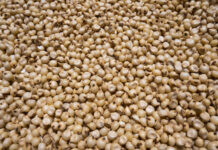Inflation is on the rise, and companies have tactically made a move to cope with it. The prices of essential items like soaps, cookies, and chips that come in single-serve packaging will remain the same. But the catch here is you are going to pay the same amount for a lesser quantity.
Companies have taken up a trend of “shrinkflation,” where your pockets won’t see a hit, but your consumption rate will definitely see an impact.
Companies that have resorted to shrinking packages
Several companies in the US, like Domino’s and Subway, have reduced their serving portions to cope with rising prices for raw materials.
Following in the same footsteps, Indian companies like Britannia, Haldiram’s, Hindustan Unilever, and Dabur India have reduced their packaging sizes to cut back costs of production.
Talking about inflation and reduction in weight of products, the chief financial officer of Hindustan Unilever, Ritesh Tiwari, said to the Business Standard that reducing the volume of certain packages is the only way for them to cope with inflation.
Products like soap bars, cookies, and snacks have seen a significant reduction in their weight in the last three months alone. Vim soap, Dabur products, and Haldiram’s aloo bhujia all now have lesser products in their new packages.
Reduction in product weight: a coping mechanism for companies
The main reason for reducing weight in the packages is to cut production costs and to maintain the customer base. Companies are under severe challenge due to the rise in the price of edible oil and dairy products.
To save companies from reduced profit margins, they are taking up new tactics like using bridge packs by introducing new package sizes between popular choices. For example, you now get to buy Lifebuoy soap between their popular range of Rs 10 and Rs 35.
Dabur India has also resorted to shrinking packages on its Rs 1, 2, and 5 products that are more popular among consumers. Mohit Malhotra, the Chief Executive Officer of Dabur, told Business Standard that inflation has severely hit the operating environment that has forced a steep decline in consumption.
Britannia could also withstand 65% of its rising input costs by shrinking the packages and weight reduction, keeping the price points constant.
Impact on consumers
An economist at Barclays Plc, Rahul Bajoria, said in a statement to the Business Standard that quantifying the effect of weight reduction on consumer budgets is not an easy task. Calculating the impact of inflation on consumers using the weight of products is quite difficult.
Essential items with reduced weight, keeping the prices the same will have a deeper impact on the economy. It seems that inflation has brought up a whole other question on what is going to happen with the standard of living of people. They have to pay the same amount for items with a reduced weight, which will have a severe impact on their consumption pattern.
IndiFoodBev — authentic, impactful and influential
An English-language food and beverage processing and packaging industry B2B platform in print and web, IndiFoodBev is in its third year of publication. It is said that the Indian food and beverage industries represent approximately US$ 900 billion in revenues which implies more than 20% of the country’s GDP. Eliminating the wastage on the farmside can help to deliver more protein to a higher number of the population apart from generating sizable exports. The savings in soil, seeds, water, fertilizer, energy and ultimately food and nutrition could be the most immense contribution that country is poised to make to the moderation of climate change.
To improve your marketing and grow sales to the food and beverage processing and packaging industry, talk to us. Our research and consulting company IppStar [www.ippstar.org] can assess your potential and addressable markets in light of the competition. We can discuss marketing, communication, and sales strategies for market entry and growth.
Suppliers and service providers with a strategy and budget for targeted marketing can discuss using our hybrid print, web, video, and social media channels to create brand recognition linked to market relevance. Our technical writers are ready to meet you and your customers for content.
The second largest producer of fruit and vegetables in the world is continuously expanding processing capacities and delivery systems with appropriate innovative technologies. We cover product and consumer trends, nutrition, processing, research, equipment and packaging from farm to thali. Get our 2025 media kit and recalibrate your role in this dynamic market. Enhance your visibility and relevance to existing markets and turn potential customers into conversations. Ask for a sample copy of our bi-monthly in print or our weekly IndiFoodBev eZine each Wednesday.
For editorial info@ippgroup.in — for advertisement ads1@ippgroup.in and for subscriptions subscription@ippgroup.in
Naresh Khanna – 10 February 2025
Subscribe Now












